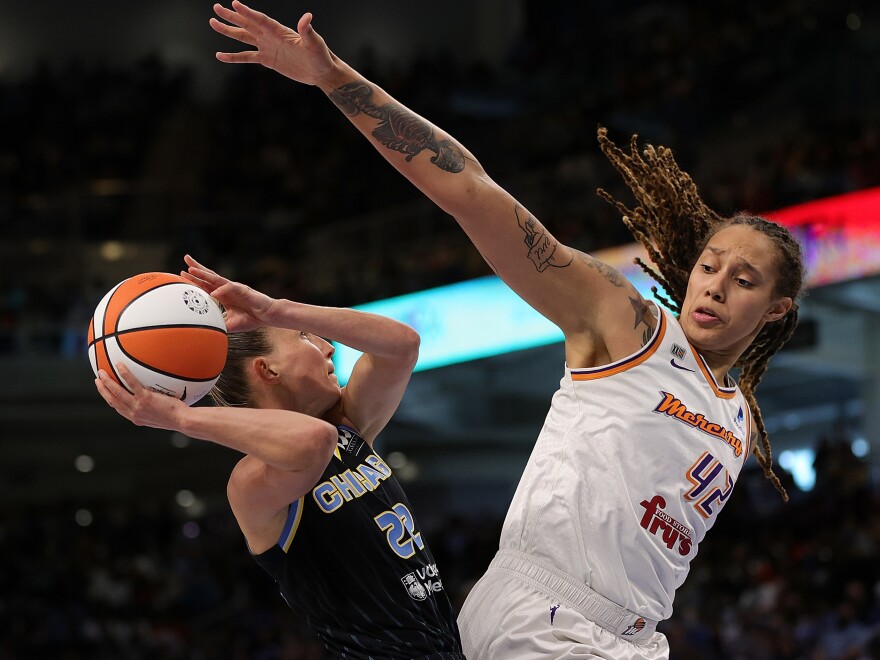In the midst of the Russian invasion of Ukraine, news of basketball player Brittney Griner's detainment on drug charges became public on Saturday.
The Russian government announced that it had detained Griner at Sheremetyevo International Airport near Moscow for allegedly transporting vape cartridges containing hashish oil in her luggage. The exact timing of her arrest is not clear, but the Russian state news agency TASS reported that it took place in February, and the government has released video of what it says is Griner's detainment.
At home, Griner is a seven-time WNBA All-Star center who plays for the Phoenix Mercury. But like many other WNBA stars, Griner heads overseas during the WNBA's off-season to make more money.
Griner plays for UMMC Ekaterinburg, as did fellow WNBA star and Mercury teammate Diana Taurasi, who left the Ekaterinburg team at the end of 2017.
As of a union agreement signed in 2020, the average income of a WNBA player was less than $130,000, with salaries maxing out somewhere around $500,000. It's a stark contrast to the salaries earned by top male NBA players, which often go up to tens of millions of dollars.
For female players, the salaries offered by foreign leagues can be a real draw. As of 2015, UMMC Ekaterinburg was paying Taurasi a reported $1.5 million per season.
When Griner was signed to Ekaterinburg, it was also not long after both she and her former wife, Glory Johnson (a former WNBA player), were both arrested on domestic violence charges. Taurasi, too, had gotten into legal troubles; working in Russia allowed them both a chance to step out of the American spotlight.
But Griner's Russian team may have its own issues with American media attention. UMMC Ekaterinburg is owned by Uzbek-born businessman Iskander Makhmudov. Makhmudov has been named as one of the oligarchs with ties to Russian President Vladimir Putin within the Putin Accountability Act that is being considered by Congress.
Late last month, ESPN reported that several WNBA players who play in Russia were planning to leave because of the Ukraine invasion, noting that some normally stay as late as April or early May before returning to their WNBA jobs.
On Sunday, U.S. Secretary of State Antony Blinken acknowledged that an American is being held in Russia but did not identify Griner by name. However, Griner's wife, Cherelle Griner, as well as the WNBA and the Phoenix Mercury, has identified Griner publicly.
In an Instagram post Monday, Cherelle Griner wrote: "My heart, our hearts, are all skipping beats everyday that goes by. ... There are no words to express this pain. I'm hurting, we're hurting. We await the day to love on you as a family."
The LGBTQ community in Russia says that it is often harassed and discriminated against by the country's government. Last month, the Russian Ministry of Justice tried to shut down one of the country's most active and prominent gay rights groups, the Russian LGBT Network.
In 2019, two people were killed and some 40 others detained during a crackdown on the LGBTQ community in Chechnya.
On Saturday, Rep. Joaquin Castro, D-Texas, suggested on Twitter that Griner had been detained because she is an American: "I'm closely monitoring reports of Texan @brittneygriner's detention in Russia," he wrote. Referring to a U.S. Marine who has been detained there for more than two years, Castro continued: "This follows a pattern of Russia wrongly detaining & imprisoning US citizens, including Trevor Reed. US citizens are not political pawns. Brittney, Trevor, and other Americans must be safely returned."
Copyright 2023 NPR. To see more, visit https://www.npr.org.




